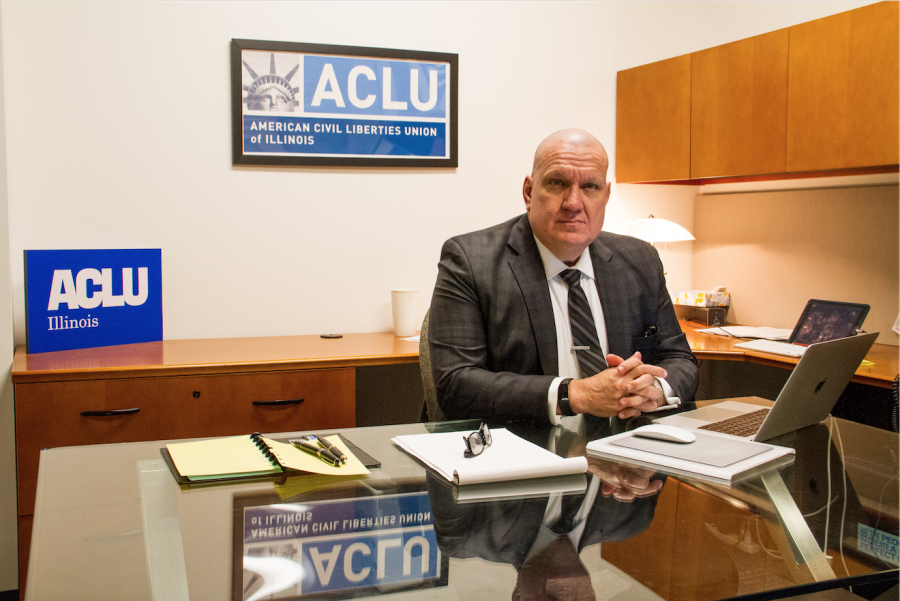The ACLU’s frontline battle challenging Trump’s overreach
The legal efforts to protect the rights of asylum seekers
Ed Yohnka has for 19 years strived to promote the American Civil Liberties Union’s mission to protect the individual rights and liberties guaranteed to every person by the law and Constitution of the United States
November 22, 2018
The three mighty arms swing in precarious balance.
If one becomes too heavy, the others have responsibility to level our democracy and safeguard the constitution.
President Donald Trump has signed an executive action denying migrants the right to claim asylum unless they enter the country through legal points of entry. Arguing the asylum process has been abused, becoming detrimental to U.S. interests, Trump claimed the same national security executive powers he used to implement his travel ban on people from several Muslim-majority nations.
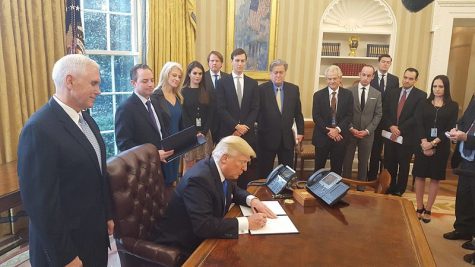
“The continuing and threatened mass migration of aliens with no basis for admission into the United States through our southern border has precipitated a crisis and undermines the integrity of our borders,” said Trump.
He said his action would protect the asylum system for those who have truly fled persecution.
As Trump’s executive arm swings into motion, the American Civil Liberties Union has brought his proclamation before federal court arguing the president’s action is unconstitutional. The ACLU is dedicated to protecting constitutional rights and sees the judiciary’s responsibility to counter-balance executive overreach.
Ed Yohnka, director of communication and public policy at ACLU Illinois, believes the checks and balances our democracy depends upon do not come with self-enforcement.
“It is our responsibility to bring a challenge to court,” he said. When the legislature is doing oversight and the judiciary is looking into executive overreach it exemplifies a healthy democracy and the rule of law being enforced.”
Yohnka believes the ACLU’s lawsuit protecting asylum rights and opposing Trump’s travel ban is a reflection of our national values.
“We have always held ourselves as a beacon of hope and resilience,” he said. “We have been a light for people around the world to come to when they’re in trouble. We can’t close us off just because Trump doesn’t approve.
“I would bring every single border enforcement agent, and I would greet (migrants in the caravan) with open arms and process them in a day.”
Under the Naturalization and Asylum Act, people have up to a year to claim asylum from anywhere in the country.
According to the U.S. Citizenship and Immigration Services, asylum requests by migrants from Guatemala, El Salvador and Honduras increased 25 percent in 2017, representing a total of 78,564 credible fear applications.
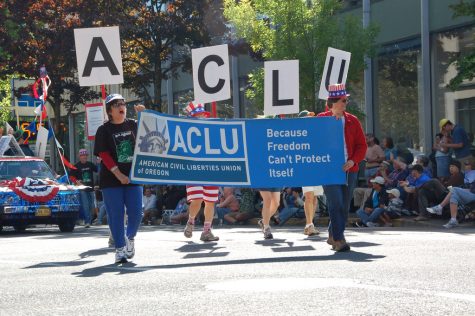
To claim asylum, someone must qualify for refugee status based on the U.N. Refugee Convention of 1951. This establishes a refugee as anyone who has fled persecution in their home country. This persecution can be on the basis of race, religion, nationality or country of origin, membership in a political group or in a particular social group, or their political opinions. Economic destitution does not qualify one for asylum.
Trump’s intent is to deter any future migrants from crossing the border. Trump lowered the U.S. refugee admissions by 20,000 in 2017 to a total of 50,000, even though the administration admitted less than half the number.
Trump’s order requires migrants immediately claim asylum upon entry and holds them to tougher restrictions to qualify for asylum status. Those denied could qualify for a “withholding of removal,” a suspension of deportation revocable at any time.
Yohnka believes Trump lacks the authority to change the law.
“Under both national and international law, there isn’t justification for closing our borders to asylum seekers,” he said. “The U.S. is party to international treaties on the rights of refugees and displaced persons. When you’re party to an international agreement it becomes integrated into your domestic law. You can’t say you don’t want to follow just because Trump is president. It doesn’t work that way.”
Yohnka said historically, the executive branch has exemplified latitude in how it enforces immigration. Each administration has prioritized standards for admission and deportation. The ACLU believes Trump illegally broke precedent by opposing the written law.
“What the Trump administration has done is they have decided everyone who is eligible should be deported,” said Yohnka. “If I want to look tough and deport people, I’m targeting people I know, and these are the people who have been checking in with me every six months. By simply treating everyone the same, this doesn’t assess one’s safety, security or what their circumstances are.
“In our lawsuits, we are arguing this is not something they can do. They can’t say they want to enforce the law and are therefore rewriting it to do so.”
The ACLU successfully challenged the Trump administration’s guidance limiting asylum on the basis of domestic abuse or gang violence in Grace v. Sessions.
Yohnka believes fierce litigation is crucial to protecting the rights of endangered and vulnerable people.
He said stories from individual migrants have painted a narrative of governments without control over gangs and violent crime. He pointed to people who are specifically targeted for what they believe, who they are, or for refusing to participate in criminal activities.
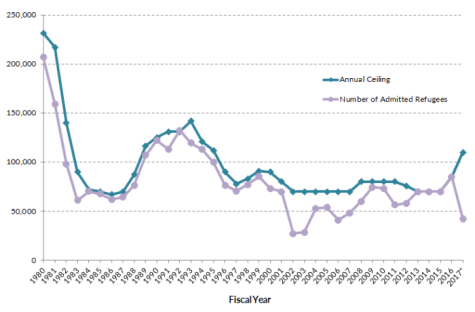
“When your government can’t protect you, and the alternative is death, it’s imperative people have a refuge and a place to travel to and feel safe,” said Yohnka. “This is what the U.S. has always been. I hear politicians say immigrants should stay where they are, but then don’t want to do the work of helping these governments handle crime. We haven’t done enough to protect and strengthen the democracy in these countries. This had led to this lawlessness, and this is what these people are fleeing.”
Yohnka said some Americans have been fooled into thinking the asylum process is easy for the seeker.
After someone turns themselves in to seek asylum, Border Patrol conducts the initial credible fear exam to establish the merits of their fear of persecution claim. If successful, seekers must go before an immigration court to pursue asylum. Lawyers spend months looking for documentation and corroborating evidence to present a credible fear case. They often receive assistance from international relief agencies and social service agencies in the countries of origin to collect the necessary evidence.
Yohnka said cases brought before judges have increasingly seen arbitrary decisions based on where one claims asylum. Success rates vary greatly based on jurisdiction.
“It demonstrates there is a perverse bias that creeps into the system depending on where someone is,” said Yohnka. “This makes it more difficult when you have judges applying different standards in different places with different levels of evidence needed.”
Legal points of entry like San Diego have wait times as long as five weeks to claim asylum. Border inspectors are processing only about 100 asylum claims a day even though 10,000 are expected to be in wait. Family detention centers are filled to capacity, stranding families seeking asylum.
In a statement the ACLU released, “We and our partners have documented numerous instances of Border Patrol agents arbitrarily and unreasonably delaying access to the asylum process by threatening, intimidating, providing misinformation, and using physical force to turn away people seeking asylum.”
The frustration grows as more migrants compete for what little resources are made available to them.
“(Trump’s) administration has been choking off points of entry,” said Yohnka. “They are not placing the appropriate amount of people, and therefore, must tell people to wait. Stranded on bridges or isolated areas, people get tired of waiting and try to cross elsewhere. These are broad swaths of dangerous desert. There are traffickers who will subject migrants to all kinds of horrors.”
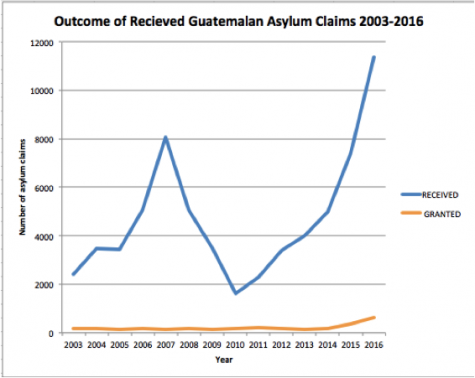
Border Patrol agents arrested 23,121 migrant family members in October, the highest monthly total of Trump’s presidency. A further 60,745 were arrested or deemed inadmissible at the border. According to the Department of Homeland Security, 20,455 people were granted asylum in 2016.
In the last five years, 75 percent of asylum cases brought by citizens from Guatemala, Honduras and El Salvador were denied.
Yohnka said Trump’s order will not affect unaccompanied minors. They will still be transferred to the care of the Office of Refugee Resettlement. Children accompanied by parents will be housed in tent camps along the border. Yohnka believes the administration is going to violate Flores V. Reno, which prohibits holding children in detention more than 20 days, arguing they had no other choice.
He sees Trump’s national security argument that was already upheld once in court as being the more challenging defense to dismantle.
“I think using terms like “invasion” and sending the military to the border was a political stunt,” said Yohnka. “He lied about the caravan every day. Trump thinks he suddenly has the capacity to rewrite the constitution and birthright citizenship through an executive order. There’s not a defined, identifiable national security interest the commander-in-chief is trying to enforce.”
Yohnka said the national security defense used to uphold the travel ban before the Supreme Court was supposed to result in an analysis and improvement of vetting procedures. However, the administration has failed to comply with these guidelines.
Yohnka believes the implausibility inherent in Trump’s travel ban is even more egregious within his new order. He argues the same defense cannot be proven before a court with respect to asylum seekers.
“The reality is this president and administration doesn’t seem to have a respect for the Constitution. We’ve sued Trump 150 times since he’s been in office,” said Yohnka.
The ACLU has challenged Trump’s executive overreach on the travel ban, family separation and restricted medical rights to youths in Office of Refugee Resettlement custody. They also filed litigation after the ban on transgender people serving in the military, and efforts to roll back rights for the LGBTQ community.
When the ACLU perceives executive overreach, they search for people whose constitutional rights have been infringed upon. Everything is decided upon the language used in the executive order. A case must be presented proving the language conflicts with applicable law and previous court rulings.
To garner public support, the ACLU focuses on the personal story of who is harmed by the president’s actions.
“When we represented MS L v. ICE, trying to reunite an asylum-seeking mother with her daughter in Chicago, we held a rally on Federal Plaza in March with only around 100 people,” said Yohnka. “By June, we held a rally at Daley Plaza with 50,000 people fighting for the same cause. People’s awareness helped support grow, especially coverage like when politicians used the phrase, “kids in cages.”
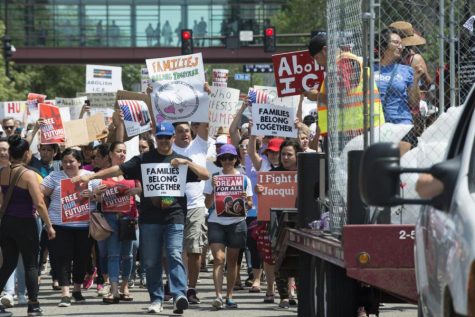
Yohnka said students can become ACLU members or just follow their cases on social media. He stressed the importance of discussing these issues with friends and family and spreading the message whenever help is in need.
“Judges make decisions based on laws and the constitution, however, they also can’t help but be moved when there are 50,000 people standing and protesting outside their door.”
——————————————————————————————-
UPDATE: 11/20/18 – U.S. District Judge Jon Tigar in San Francisco issued a temporary restraining order against Trump’s executive order to deny migrants the right to claim asylum who enter the country illegally.
“Whatever the scope of the president’s authority, he may not rewrite the immigration laws to impose a condition that Congress has expressly forbidden,” ruled Tigar.
The restraining order will remain in place until a December court hearing brought by the ACLU, the Southern Poverty Law Center and the Center for Constitutional Rights against Trump’s executive order can be argued.

